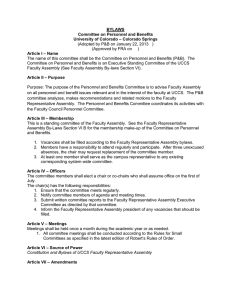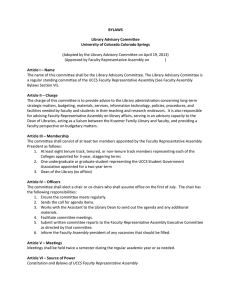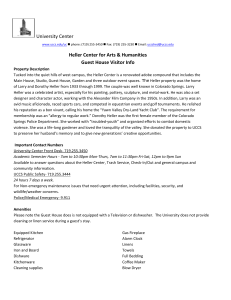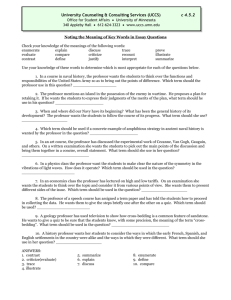2015 Biennial Review Drug-Free Schools and Communities Act July 2013-June 2015
advertisement
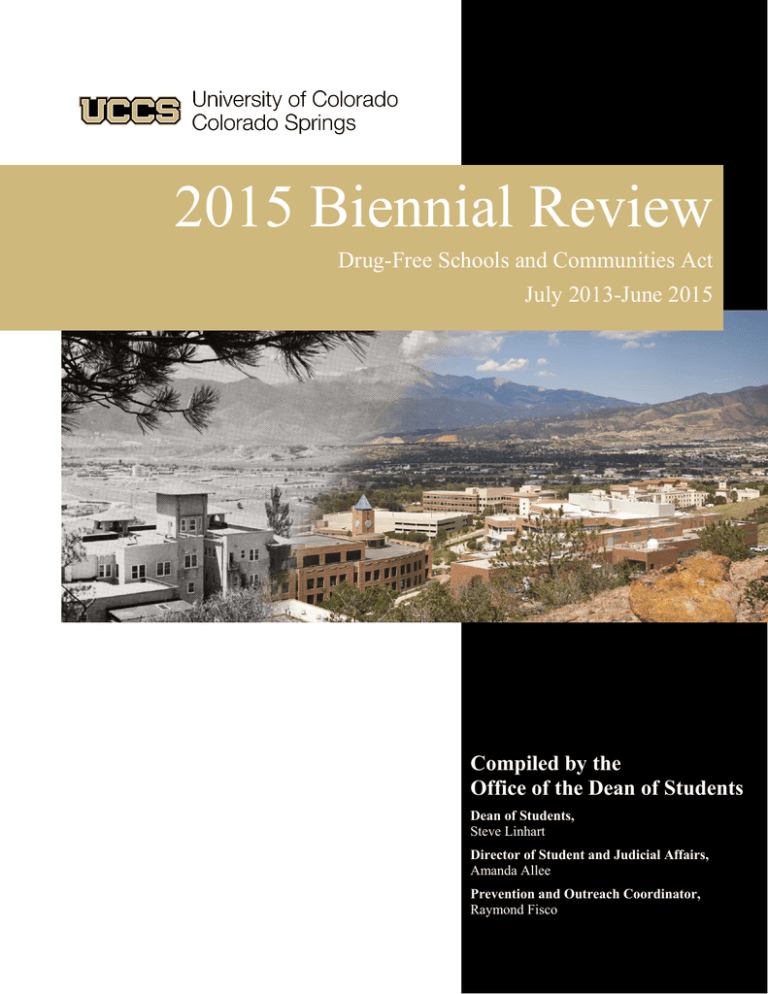
2015 Biennial Review Drug-Free Schools and Communities Act July 2013-June 2015 Compiled by the Office of the Dean of Students Dean of Students, Steve Linhart Director of Student and Judicial Affairs, Amanda Allee Prevention and Outreach Coordinator, Raymond Fisco TABLE OF CONTENTS Introduction of the Biennial Review………………………….......................... 2 Objective I. Alcohol and Other Drug Prevention Programming A. Program Elements, Goals, and Achievements …………………............. B. Strengths and Weaknesses ………..……………………......................... C. Recommendations and Threats…………………………………………. 3 6 7 Objective II. Alcohol and Other Drug Policy Compliance A. Distribution Procedures…………………………………………………. 1. Annual Notifications 2. Campus Policies B. Enforcement of Sanctions and Case Documentations………………….. 1. Campus Policy Enforcement 2. Case Documentation and Statistics References and Resources…..………………………………………………… 2015 Biennial Review University of Colorado Colorado Springs 8 10 13 1 Introduction of the Biennial Review In accordance with the Drug Free Schools and Communities Act (DFSCA), Education Department General Administrative Regulations (EDGAR) Part 86, the University of Colorado Colorado Springs (UCCS), as an institution of higher education with federal funding is required to conduct a Biennial Review of all alcohol and drug prevention efforts. The Biennial Review requires the following two objectives be met: 1. To determine alcohol and other drug (AOD) prevention program effectiveness by identifying and implementing needed changes through a description of AOD program elements, goals and achievements, strengths and weaknesses, procedures for distributing AOD notifications, copies of policies available to students, and recommendations. 2. To enforce the sanctions fairly and consistently through reviews of past cases and documentation of the efforts to support the standards of conduct. In order for the Biennial Review to be completed, the following offices were used to provide information through statistics, interviews, and online resources for the Biennial Review process: Office of the Dean of Students Department of Public Safety Student Health Center University Counseling Center Office of Residence Life and Housing Campus Recreation Center Office of Student Activities Human Resources Office Office of Student Life and Leadership The data collected will be made available online through the Office of the Dean of Students and the Alcohol and Other Drugs websites. Printed copies may be requested from the Office of the Dean of Students. The purpose of this report is to meet the requirements set forth by the DFSCA in conducting a Biennial Review, as well as educate the UCCS campus community on alcohol and drug prevention from July 2013 to June 2015. 2015 Biennial Review University of Colorado Colorado Springs 2 Objective I. Alcohol and Other Drug Prevention Programming A. Program Elements, Goals, and Achievements UCCS utilizes the Substance Abuse and Mental Health Services Administration (SAMHSA) Prevention Model for Alcohol and Other Drug (AOD) Prevention Programming. This model recommends a multitier approach focusing on prevention strategies for universal, selective, and indicated populations. In this model, the majority of the University’s prevention efforts focus on primary prevention at the universal level. Prevention strategies provide alternatives to high-risk behavior and educates all students on pro-social behaviors. Prevention strategies for the selective population focus on early intervention and harm reduction for groups of students with identifiable risk-factors, such as housing students and incoming freshman. The third tier of the prevention model, the indicated group, focuses on those who have been referred to judicial affairs for alcohol or drug policy violations. The figure below indicates where programming efforts fall within the tier system: AOD prevention program activities implemented from July 1, 2013 to June 30, 2015 by multiple UCCS departments are described below: 2015 Biennial Review University of Colorado Colorado Springs 3 1 2 CHOICES1 o 90 minute peer-facilitated class given 1-2 times per month during the Fall and Spring semesters for students who were referred by Residence Life and/or the Office of the Dean of Students for a first time alcohol violation o Alcohol abuse prevention and harm reduction program for college students involving reflective journaling o GOAL: “To educate college students about the effects of alcohol on their behavior, to promote self-evaluation of drinking pattern and to facilitate the acquisition of effective coping strategies so that students can make informed decisions and reduce their alcohol-related risk and harm”2 Counseling and Community Referrals o The University Counseling Center offers a one-time counseling assessment for students who have repeat alcohol or drug violations. They also offer continuing counseling services and community referrals if deemed necessary through the assessment process o GOAL: To conduct a mental health threat assessment and if needed develop a prevention or treatment plan which could include follow-up counseling sessions, support groups, or community referrals Campus and Personal Safety Presentation1 o 20-30 minute presentation during Freshman and Transfer student orientations o 2013: 1700 Freshmen Students, 742 Transfer Students o 2014: 1831 Freshmen students, 697 Transfer Students o 2015: 1896 Freshmen Students, 1057 Transfer Students o Addresses overall campus safety for students, drug and alcohol awareness, sexual harassment, assault prevention, and emergency preparedness o GOAL: To educate students on local laws, UCCS policies, and the Student Code of Conduct Residence Life and Housing AOD Program o August 2013 and 2014: Housing Health Bingo included AOD information presented to all Freshmen living on-campus o Each Resident Assistant is required to do one health and safety program per semester which includes information on the effects of alcohol and drugs 1 SIDNE o Offered 2 times per year on campus o SIDNE (Simulated Impaired Driving Experience): Battery-powered vehicle in which alcohol and other drug impairment is simulated through a delayed response mode o GOAL: Demonstrate the dangers of impaired driving http://www.uccs.edu/asr/crime-prevention-and-education.html (Kathryn K. Calhoon, Parks, & Marlatt, 2005) 2015 Biennial Review University of Colorado Colorado Springs 4 3 4 THINK Committee o Campus-wide committee with Departments represented from Public Safety, Dean of Students Office, Student Activities, Student Health Center, University Counseling Center, Student Government, and Residence Life and Housing. o GOAL: “THINK is a drug and alcohol awareness committee on campus committed to raising awareness of the consequences of drug and alcohol use.”3 Safe Spring Break 2014, 2013 Week of awareness raising events. GOAL: To encourage college students to have a safe spring break by remembering safety tips (about impaired driving, alcohol abuse, road safety, sun exposure, and making decisions about sexual activity and health) and taking a pledge to be safe National Collegiate Alcohol Awareness Week Campaign 2014, 2013 Campaign #makeSMARTchoices GOAL: Recognize the close connection between alcohol abuse and impaired driving and educate students of the consequences of drinking alcohol HAZE Documentary o Shown in October 2013 and in October 2014 o Sponsored by Public Safety, THINK Committee, Health Center, Residence Life, Freshman Seminar, the Office of Student Activities, and the Office of the Dean of Students o 2 hour and 20 minute documentary examining high risk drinking behavior and the death of college student Gordie Bailey o GOAL: To save lives by educating college students on the dangers of alcohol abuse and hazing Drug and Alcohol Information Seminar4 o Available to departments or student groups by request o GOAL: Recognize controlled substances, their effects on people, and what to do if one suspects that someone is using or selling drugs FATAL VISION® Goggles o Fatal Vision® Goggles simulate sight impairment for three levels of estimated BAC (less than .06, .07 to .10+, and .17 to .20+) in both daylight and nighttime conditions o GOAL: Demonstrate the concept of impairment and the dangers of alcohol and drug misuse to students Mountain Lion 101 o Freshman Orientation Session featuring speakers related to responsible drinking, consent, healthy relationships, and discrimination and harassment. o Goal: educate all incoming freshman on UCCS policies and procedures http://www.uccs.edu/pusafety/police/prevention/think-drug-and-alcohol.html http://www.uccs.edu/asr/crime-prevention-and-education.html 2015 Biennial Review University of Colorado Colorado Springs 5 Additional activities for alcohol and drug awareness hosted on-campus: o Motivational interview meeting held with students reported for alcohol and/or drug offenses o Greek Life and Athletics educational programs (held once per semester) o Office of Student Activities (OSA) hosts events throughout the year to provide a fun alternative to drinking. Disorientation Week, Welcome Week, and ROAR Daze all feature multiple alcohol-free social events and are held during strategic points throughout the year to curb high-risk drinking behavior B. Program Strengths and Weakness Strengths and weakness of the AOD program were collected from participants of the THINK committee, a campus wide committee committed to raising awareness of the consequences of drug and alcohol use. Feedback was compiled by the Office of the Dean of Students. Strengths 5 6 Consistent enforcement of Student Conduct Process for underage drinking Choices Courses o Participants indicated the program was effective in increasing awareness of alcohol risks and facts surrounding drinking5 o 2% recidivism rate 6 Good Samaritan Policy for students that are seeking help for themselves or others Freshman Orientation presentation: interactive presentation that educates incoming students on UCCS policies, Good Samaritan Law, and getting help for others Completion of the ACHA - NCHA II Survey for the first time; yielded a high response rate and base-line data to measure effectiveness of future prevention efforts Majority of students completing the ACHA-NCHA II Survey reported that they had received information alcohol and other drugs Strong communication and cooperation between involved departments Campus involvement with the Colorado Coalition of Alcohol and Drug Educators Developed off-campus referral system with UCCS Campus Police and Colorado Springs Police Department Increased peer education Established formal ties with Freshmen Gateway Program Created a more robust Good Samaritan Clause in Student Code of Conduct, accomplished with input from SGA & Students Clubs (Spring 2014) Additional staffing to support campus wide prevention efforts Course post-test and satisfaction surveys Calculated based on reported repeat offenders during the period of review. 2015 Biennial Review University of Colorado Colorado Springs 6 Weaknesses Resources available to devote to alcohol and drug prevention efforts; no single office or staff dedicated to AOD prevention Limited off-campus resources; no regional coordination between higher education institutions Cost of program implementation Student involvement and program delivery beyond RAs Non-regulated off-campus house parties Consistent Assessment of programs C. Program Threats and Recommendations Program threats and recommendations were also compiled by the THINK committee. Threats Growing campus population Increase in residential student population Privately-owned housing communities located near campus opening fall 2014 No alcohol education required beyond orientation sessions Unregulated off-campus parties Legalization of marijuana in Colorado Recommendations 7 Develop Social Norming Campaign based on survey data and grounded in proven practices Explore new awareness speakers/events for National Collegiate Alcohol Awareness Week Partner with community designated driver/safe ride programs Explore party registration programs for off-campus students (Similar to CU Boulder7) Explore expanding AOD outreach programs and prevention efforts through dedicated staff/office and launching new high profile events http://ocss.colorado.edu/content/party-registration-program-0 2015 Biennial Review University of Colorado Colorado Springs 7 Objective II. Alcohol and Other Drug Policy Compliance A. Distribution Procedures 1. Annual Notifications In order to comply with the Drug-Free Schools and Campuses Regulations, Part 86, procedures for distributing annual Alcohol and Other Drug (AOD) notifications to all enrolled UCCS students and all employees are the following: Electronic: Paper: Emails are sent out to all students (off-campus, abroad, and on-line) and all employees (full-time, part-time, off-campus, online) at the beginning of each Fall and Spring semesters. AOD notifications and policies can all be found online (See Objective I. C. 2.) Resident students receive the Resident Handbook, which contains the AOD policies Posters with substance free events are placed around campus “Schedule of Courses” booklets can be found for each semester and include notifications and policies in brief Presentation: Presentations involving AOD policies are given to First Year students and Transfer students at orientations Presentations at various campus events 2. Campus Policies Many of the policies listed below are from the Alcohol and Other Drug UCCS website, which was created and is maintained by the Office of the Dean of Students. The AOD website includes information on: University policies Health effects information Resources and services available on and off campus Penalties and sanctions for misuse of alcohol and other drugs 2015 Biennial Review University of Colorado Colorado Springs 8 All policies including AOD resources and legalities: Student Code of Conduct: http://www.uccs.edu/~Documents/dos/Student%20Code%20of%20Conduct-UCCS.pdf (Page 4 of document) Campus Alcohol Policy #100-003: http://www.uccs.edu/Documents/vcaf/policies/100-003Alcohol2013.pdf Drug Free Workplace Act: http://www.uccs.edu/asr/drug-free-workplace.html Financial Aid Drug Convictions Policy: http://www.uccs.edu/finaid/policies/drug.html Human Resources—State of Colorado Substance Abuse Policy: Document downloadable from http://www.uccs.edu/aod/policy.html under “State of Colorado Substance Abuse Policy” Public Safety Drug and Alcohol Policy: (Part A): http://www.uccs.edu/asr/alcohol-and-drug-policy.html (Part B): http://www.uccs.edu/asr/drug-free-workplace.html Athletic Department AOD Intramural Sports Policy: http://www.uccs.edu/Documents/campusrec/1213%20Intramural%20Sports%20Handbook.pdf (Page 23 of document) Athletic Department AOD Club Sports Policy: http://www.uccs.edu/Documents/campusrec/2012%20Club%20Sports%20Handbook.p df (Page 12 of document) Athletic Department Alcohol and Other Drug Testing Policy: http://www.uccs.edu/aod/policy.html Alcoholic Beverages and Substance Abuse Policy—University Housing (Page 3 of document): http://www.uccs.edu/Documents/residence/1213%20Housing%20Handbook%20Final %20for%20printing.pdf 2015 Biennial Review University of Colorado Colorado Springs 9 B. Enforcement of Campus Policies and Case Documentation 1. Campus Policy Enforcement Campus Enforcement UCCS Police Officers do routine patrols of campus to ensure all students, faculty, staff, and campus visitors are complying with state and federal laws, as well as University Policies. The department maintains strict internal guidelines for ensuring all parts of campus are being checked on a regular basis. Public Safety also employs security officers, in addition to their police officers, to provide additional monitoring of high-risk areas. These security officers have direct access to UCCS police dispatch, so they can quickly report any suspicious activity. Housing Enforcement In addition to regular foot patrols by UCCS Police and security guards, Resident Assistants (RAs) are required to do rounds through all of the housing areas to check for any policy violations. RAs are provided with training on AOD policies and enforcement prior to the Fall and Spring semesters. Additionally, two full time professional staff members reside in the residence halls, and there is always a student staff member and a professional staff member on-call after hours for incidents occurring in housing areas. Judicial Process The judicial process is initiated when a Residence Life Incident Report, a Police Report, or a written complaint with sufficient information is received by either the Dean of Students Office or the Office of Residence Life and Housing. Upon receipt of the complaint or report, the judicial officer may conduct an investigation to decide whether there is substance to the allegations, whether the allegations fall within the jurisdiction of this policy, and whether conduct proceedings should occur. The student is notified and the case is heard according to the guidelines provided by the Student Code of Conduct. If the student is found responsible, sanctions imposed for misconduct must be based upon a consideration of all the circumstances in a particular case. First and second offenses may include the following: a) Parental notification; b) Probation; c) Attendance of a University sponsored alcohol awareness class; d) Substance abuse assessment referral; e) Community service; f) Written educational assignments. Third or subsequent offenses may include suspension or expulsion. Mitigating and aggravating circumstances are considered in the case and repeated violations are likely to result in progressively more severe sanctions. Sanctioning of alcohol and drug violations may be more severe if the incident includes any of the following aggravating factor(s): public intoxication, provision of alcohol/drugs to minors, driving a vehicle under the influence of alcohol/drugs, damage to property, and obstruction of a peace officer or failure to cooperate with a University official. Sanctioning may also be 2015 Biennial Review University of Colorado Colorado Springs 10 more severe if the violation is accompanied by other violations of the Student Code of Conduct or multiple violations of the Student Code of Conduct. All conduct cases are managed and tracked through a judicial software. Cases are reviewed annually by the Dean of Students, Associate Director of Housing, and Public Safety Operations Manager to ensure fair and consistent enforcement of sanctions by hearing officers. Complete information on the UCCS judicial process can be found at: http://www.uccs.edu/dos/student-conduct/student-code-of-conduct.html 2. Case Documentation and Statistics In order to measure consistency in enforcement of AOD offenses, the Biennial Review for the DFSCA requires institutions of higher education to document each case and treat each case with similar repercussions. Each case reported through UCCS public safety can be viewed at the following link on UCCS’ website: http://www.uccs.edu/pusafety/blotter/2016-crimefire-logs.html Violations Recorded From July 2013-June 2015 there were 185 cases reported to public safety involving alcohol and/or drug misuse. The table below indicates the type of case and the number of cases for each 6 month period during this time. Cases may have involved multiple individuals. July-December 2013 Alcohol Misuse Drug Misuse Alcohol and Drug Misuse Total July-December 2014 40 JanuaryJune 2014 8 41 JanuaryJune 2015 44 15 6 17 11 1 0 1 1 56 14 59 56 2015 Biennial Review University of Colorado Colorado Springs 11 Violation Case Dispositions The table below indicates the outcome of the cases reported to UCCS Public Safety during this two year period. Because cases may have involved multiple individuals, more than one outcome may have occurred with the case. Case Open-The case is still being investigated JulyDecember 2013 0 JanuaryJune 2014 1 JulyDecember 2014 0 JanuaryJune 2015 0 0 0 1 1 25 19 24 10 0 0 2 1 32 26 3 6 0 0 1 1 1 0 1 1 Case Open Inactive-The case is left open pending information that would allow the investigation to continue. Case Closed by Arrest-The suspect(s) in the case have been identified and have been either summonsed into court or booked into jail. Case Closed Unfounded-The report of a crime has been unsubstantiated through investigation. Case Closed by Referral-The subject(s) in the case have been issued verbal warnings for their actions and referred to the appropriate university authority. Case Closed Exceptionally-The victim in the case has chosen not to file charges against the suspect. Case Closed-All appropriate action in the case has been taken and has not resulted in an arrest or referral. There have been no drug and alcohol-related fatalities at UCCS during this two year time period. Judicial Sanctions The table below indicates the number of students assigned to the following sanctions for drug or alcohol offenses this two year period, from July 2013 to June 2015. Students may have been assigned to more than one sanction. Alcohol Choices Class Marijuana Choices Warning/Probation Housing Exclusion Suspension Other Sanctions July-December 2013 39 10 ** ** ** January-June 2014 9 July-December 2014 42 13 16 January-June 2015 43 11 123 1 7 21 ** Data lost in software transition. 2015 Biennial Review University of Colorado Colorado Springs 12 References and Resources American College Health Association (2013). National College Health Assessment II. Retrieved from http://www.achancha.org/ Colorado State University – Pueblo. (2012). 2012 Biannual review alcohol and other drug prevention. Retrieved from http://www.colostatepueblo.edu/CounselingCenter/Documents/Biennial%20Review%20%20Final%20Final%20July%203%202012%20for%20posting%20with%20President% 20Letter.pdf Calhoon, K., Parks, M. & Marlatt, G. P. (2005). CHOICES: About alcohol (facilitator guide). The Change Companies, Marlatt and Parks. Pittayathikhun, T., Ku, R., Rigby, D., Mattsson, M., & DeJong, A. W. (2006). Complying with the drug-free schools and campuses regulations. Newton, Massachusetts: U.S. Department of Education. Univeristy of Colorado Boulder, Off-Campus Housing and Neighborhood Relations. (2013). Party registration program. Retrieved from http://ocss.colorado.edu/content/partyregistration-program-0 Univeristy of Colorado Colorado Springs, Department of Public Safety. (2013). Annual security report and fire safety report. Retrived from http://www.uccs.edu/asr/alcohol-and-drug-policy.html Univeristy of Colorado Colorado Springs, Department of Public Safety. (2013). Crime Prevention. Retrieved from http://www.uccs.edu/pusafety/police/prevention.html University of Colorado Colorado Springs, Department of Public Safety. (2013). Daily Crime Fire Log. Retreived from http://www.uccs.edu/pusafety/police/blotter.html University of Colorado Colorado Springs, Office of the Dean of Students. (2013). Alcohol and Other Drugs. Retrieved from http://www.uccs.edu/aod/index.html University of Colorado Colorado Springs, Office of the Dean of Students. (2013). Dean of Students. Retrieved from http://www.uccs.edu/dos/index.html University of Colorado Colorado Springs, Office of Residence Life and Housing. (2013). Residence life and housing policies. Retrieved from http://www.uccs.edu/residence/current-resident/policies.htm University of Dayton. (n.d.). Party Tips. Retrieved from http://wwwstaging.udayton.edu/studev/wellness/resources/party_tips.php 2015 Biennial Review University of Colorado Colorado Springs 13


